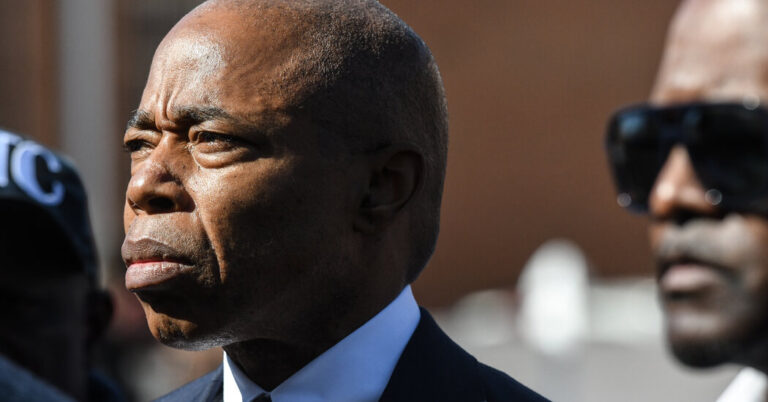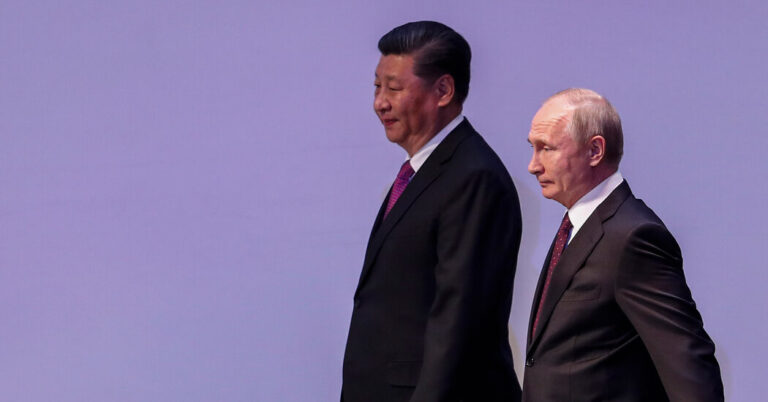Trump Asks to Dismiss Suit as A.G. Says He Inflated Worth by $2.2 Billion
Before Donald J. Trump was indicted four times over, he was sued by New York’s attorney general, who said that for years the former president, his business and members of his family had fraudulently overvalued their assets by billions of dollars.
Before any of those criminal trials will take place, Mr. Trump is scheduled for a civil trial in New York in October. During the trial, the attorney general, Letitia James, will seek to bar him and three of his children from leading their family business, the Trump Organization, and to require him to pay a fine of around $250 million.
On Wednesday, Ms. James fired an opening salvo, arguing that a trial is not necessary to find that Mr. Trump and the other defendants inflated the value of their assets in annual financial statements, fraudulently obtaining favorable loans and insurance arrangements.
The fraud was so pervasive, she said in a court filing, that Mr. Trump had falsely boosted his net worth by between $812 million and $2.2 billion each year over the course of a decade.
“Based on the undisputed evidence, no trial is required for the court to determine that defendants presented grossly and materially inflated asset values,” the filing said.
But Mr. Trump’s lawyers, in their own motion, argued that the entire case should be thrown out, relying in large part on a recent appellate court decision that appeared as if it could significantly narrow the scope of the case because of a legal time limit. Mr. Trump had received most of the loans in question too long ago for the matter to be considered by a court, his lawyers argue.
“The appellate division has now limited the reach of the N.Y. A.G.’s crusade against President Trump and his family” wrote Mr. Trump’s lawyers, Christopher M. Kise, Michael Madaio and Clifford S. Robert.
Both filings seek what is known as summary judgment, or a ruling from the judge that they are entitled to a victory before trial based on undisputed facts in evidence.
Ms. James sought that ruling on the claim at the core of her case — that Mr. Trump’s financial statements were fraudulent — and if she prevails, it would mark a significant victory and could smooth her path to a potential win at trial on the remaining claims.
If Mr. Trump won even partial summary judgment, the case could become a shadow of what it once appeared, significantly lowering the stakes of the October trial.
Or the judge could deny both bids for early victory, which would simply set the case for trial.
The judge, Arthur F. Engoron, is scheduled to hold a hearing in late September and could rule then.
Ms. James’s lawsuit disputes the value of some of Mr. Trump’s best-known properties, including Mar-a-Lago, his Florida estate, and Trump Tower in Midtown Manhattan. In her new filing, she wrote that, given the way that the worth of Trump Tower was calculated in 2018, it was overvalued by nearly $175 million. The following year, she said, the value of the building was falsely boosted by nearly $323 million.
“At the end of the day this is a documents case,” the filing unsealed on Wednesday said, adding that the documents left not a shred of doubt that Mr. Trump’s annual financial statements “do not even remotely reflect the ‘estimated current value’ of his assets.”
Ms. James also took aim at Mr. Trump for submitting the financial statements to obtain loans for a golf resort outside Miami, a hotel in Washington and a hotel in Chicago.
Yet Mr. Trump’s lawyers argue that Justice Engoron should throw out those transactions from the case, citing the recent appellate court ruling. In that ruling, the appeals court dismissed Ms. James’s case against his daughter, Ivanka Trump, because the accusations concerned conduct that had occurred too long ago. As Mr. Trump’s lawyers interpret the appellate ruling, any loans that Mr. Trump and his company received before July 2014 were too old to be included in the case.
The appeals court declined to throw out the case against Mr. Trump, his company and his two adult sons — effectively leaving it to Justice Engoron to decide. But Mr. Trump’s lawyers noted in their motion for summary judgment that the loans for the Chicago hotel and Florida resort were negotiated before the July 2014 legal deadline.
Mr. Trump’s lawyers also argued that Mr. Trump’s lenders did not rely heavily on his financial statements when issuing him loans, and that the lenders reaped millions from their dealings with the former president.
“The sophisticated private parties all profited considerably from successfully consummated transactions,” Mr. Trump’s lawyers wrote. “Thus, ‘fraud’ cannot exist in the abstract or solely in the mind of the N.Y. A.G.”
Mr. Trump invoked his constitutional right against self-incrimination when initially questioned by the attorney general’s office last year. But he answered Ms. James’s questions in a deposition in April, the transcript of which was unsealed on Wednesday.
Many of his answers were non sequiturs and recycled political grievances. But occasionally he did respond substantively to questions from Kevin Wallace, a senior enforcement counsel in Ms. James’s office.
At one point, Mr. Wallace asked the former president whether he was aware of any instances in which an accountant had identified fraud at the Trump Organization.
“Not often. I don’t — I don’t know; not often,” Mr. Trump responded.
Mr. Wallace followed up, asking if Mr. Trump remembered specifics.
“Not — I mean, not — I can check, but not that I know of,” the former president replied. “Normally that wouldn’t be brought to me.”
Check out our Latest News and Follow us at Facebook
Original Source







